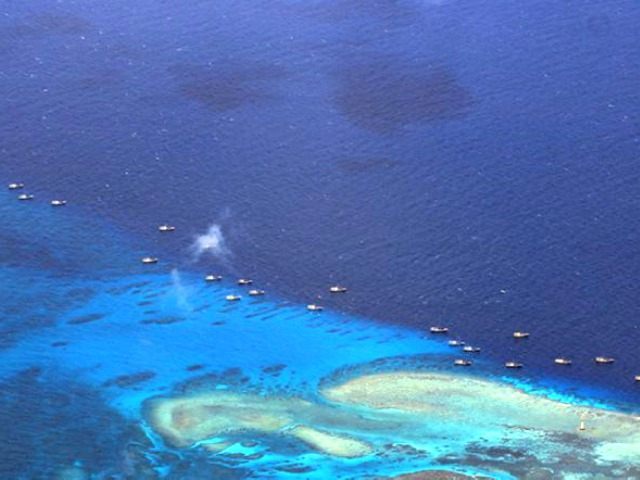The governments of Vietnam, the Philippines, and Japan have all condemned China for landing a plane on an artificial island in the South China Sea, constructed in what is widely regarded as sovereign Vietnamese territory. China rejects international claims in the sea and has begun constructing military facilities in the Spratly Islands.
The flight apparently took place on Saturday, described by the Chinese Foreign Ministry as a “civilian” test flight to check the functionality of a newly completed jet landing strip on an artificial island built over Fiery Cross Reef in the Spratly Islands. Vietnam, the Philippines, Taiwan, Brunei, and Malaysia all contest parts of the South China Sea that China has claimed as its own; Vietnam and the Philippines both claim parts of the Spratly Islands.
“Vietnam resolutely protests China’s above-mentioned action, asking China to immediately end while not repeating similar move,” Vietnamese Foreign Ministry spokesman Le Hai Binh said on Saturday, adding that the move was “a serious infringement of the sovereignty of Vietnam on the Spratly archipelago, contrary to the common perception of high-ranking leaders of the two countries and [to] an agreement on the basic principles for directly solving maritime issues between Vietnam and China.”
The government of the Philippines announced Monday it would file a formal protest against China over the flight, claiming the Fiery Cross Reef for itself. “We will file it in due course,” Department of Foreign Affairs Spokesman Charles Jose said of the protest. He made explicit the Philippines’ belief that “Fiery Cross or Kagitingan Reef is part of our Kalayaan Island Group,” and that the Philippines fears “China will be able to take control of the South China Sea, and it will affect the freedom of navigation and freedom of overflight plus unimpeded flow of commerce.”
The government of Japan – which does not make any territorial claims in the South China Sea, but does dispute Chinese claims in the East China Sea – issued a statement expressing “grave concern” over the flight in the Spratly Islands. “Japan is gravely concerned about China’s act, which is a unilateral change of the status quo… [Japan] cannot accept [this act] which is escalating tensions and is a concern shared by the international community,” Foreign Minister Fumio Kishida said Monday.
The United States, which has maintained an active role in opposing Chinese claims in the region, issued a lukewarm statement urging both China and Vietnam to “publicly commit to a reciprocal halt to further land reclamation construction of new facilities and militarization of disputed features.” While Vietnam does have a plane landing strip in the Spratly Islands, it is much smaller than the one recently built by China and cannot accommodate military planes.
China has responded to the widespread rejection of its claims with a statement asserting that its activity in the region is legal. “Relevant activity falls completely within China’s sovereignty… China has indisputable sovereignty over the Nansha [Spratly] Islands and their adjacent waters. The Chinese side will not accept the unfounded accusation from the Vietnamese side,” Foreign Ministry spokeswoman Hua Chunying said in a statement. She did not address a second protest made by Vietnam regarding Chinese activity near the Spratly Islands: that China has repeatedly violently assaulted civilian Vietnamese fishermen, sinking multiple ships.
Vietnam contends that a Chinese ship rammed into a Vietnamese fishing vessel on Friday, sinking the ship and leaving its 11 crew members to keep afloat until rescued. The captain of the ship told investigators he saw Chinese lettering on the ship attacking them. A similar incident occurred in the nearby Paracel Islands in October.
The International Court of Arbitration at the Hague has determined that it has jurisdiction to rule on where China’s maritime borders end in the South China Sea, following a petition by the Philippines demanding the court issue a legal clarification. The Chinese government has dismissed the Hague as being an irrelevant actor in the dispute, despite the Philippines properly using the international legal process to bring the case before that court.

COMMENTS
Please let us know if you're having issues with commenting.